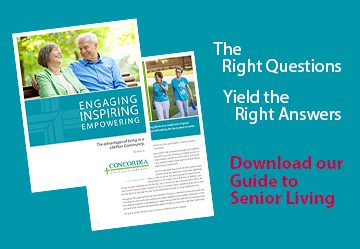
Normal Age-Related Memory Loss vs. Signs of Alzheimer’s Disease
For many aging adults, those little lapses in memory lightheartedly referred to as “senior moments” seem to increase every week. There have probably been several instances where you can’t remember the aisle your car is parked in, or perhaps an incident where you walk into a room with a purpose in mind, only to have no idea what you needed when you get there.
This forgetfulness is often a normal part of the aging process due to some of the changes your brain undergoes. However, many seniors start to get concerned something more serious may be occurring. Since Alzheimer’s disease is most prevalent in those age 65 and older, it’s important to learn the differences between age-related memory loss and the signs of Alzheimer’s disease.
When to be Concerned about Memory Loss in Seniors
Normal Memory Loss in Seniors
Neurons in the brain start to shrink or can be damaged by molecules called free radicals or conditions like high blood pressure. As these neurons become impaired, remembering recently-learned information, such as your granddaughter’s new boyfriend’s name, can get challenging. Additionally, other biological changes, such as the deterioration of the area of the brain known as the hippocampus or medical conditions like liver or thyroid disorders can all affect your memory. High levels of stress, depression or anxiety can also make you more forgetful and can sometimes be mistaken for Alzheimer’s symptoms.
Some of the most common memory lapses due to the above conditions include:
- Misplacing or forgetting where you set down items like your glasses or purse
- A temporary block in retrieving memories, known as absentmindedness
- Missing appointments when they are not written down on a calendar
- Remembering some details of an event inaccurately or forgetting specific facts about an event that happened in the past
- Having trouble focusing on a project or getting easily distracted
- Difficulty remembering information you just recently learned, like the name of the new grocery store that just opened
Warning Signs of Alzheimer’s
In the early stages of Alzheimer’s disease, some of the milder symptoms can be quite similar to the normal memory loss associated with aging. If you’re concerned you may be experiencing any of the early signs of Alzheimer’s disease, it’s important to visit your doctor to find out if you’re truly at risk.
The most common warning signs of Alzheimer’s disease include:
- The inability to recognize familiar faces or forgetting a loved one’s name altogether
- Trouble performing everyday tasks, like paying bills and balancing a checkbook
- Becoming disoriented or lost in familiar places
- Calling every day objects by an incorrect name, like calling a spoon a pen
- Difficulty remembering details about an event you recently attended
- Forgetting the rules or steps to activities you enjoy, like favorite card games or knitting, or losing interest in these activities entirely
- Falling victim to a scam targeting seniors due to poor judgment
Compassionate Memory Care and Support at Concordia Life Care Community
At Concordia, we offer personalized Alzheimer’s and dementia care in a unique, secure environment with all the comforts of home. Our mission is to enhance the lives of residents and their family members through compassion, kindness and a thorough understanding of the challenges those living with Alzheimer’s disease and dementia face. To learn more about our continuing care retirement community in OKC, please contact us today.
Health & Aging

